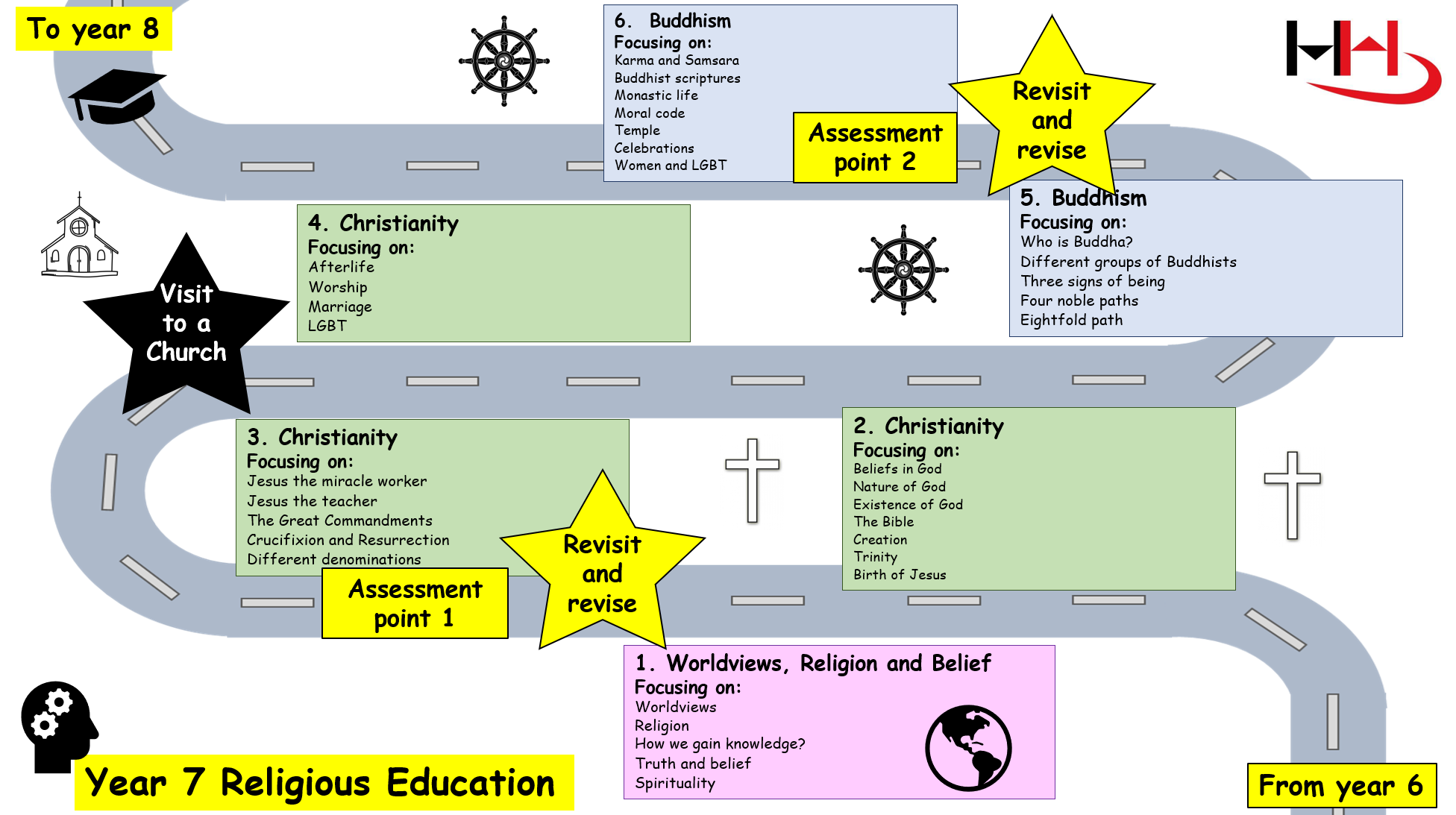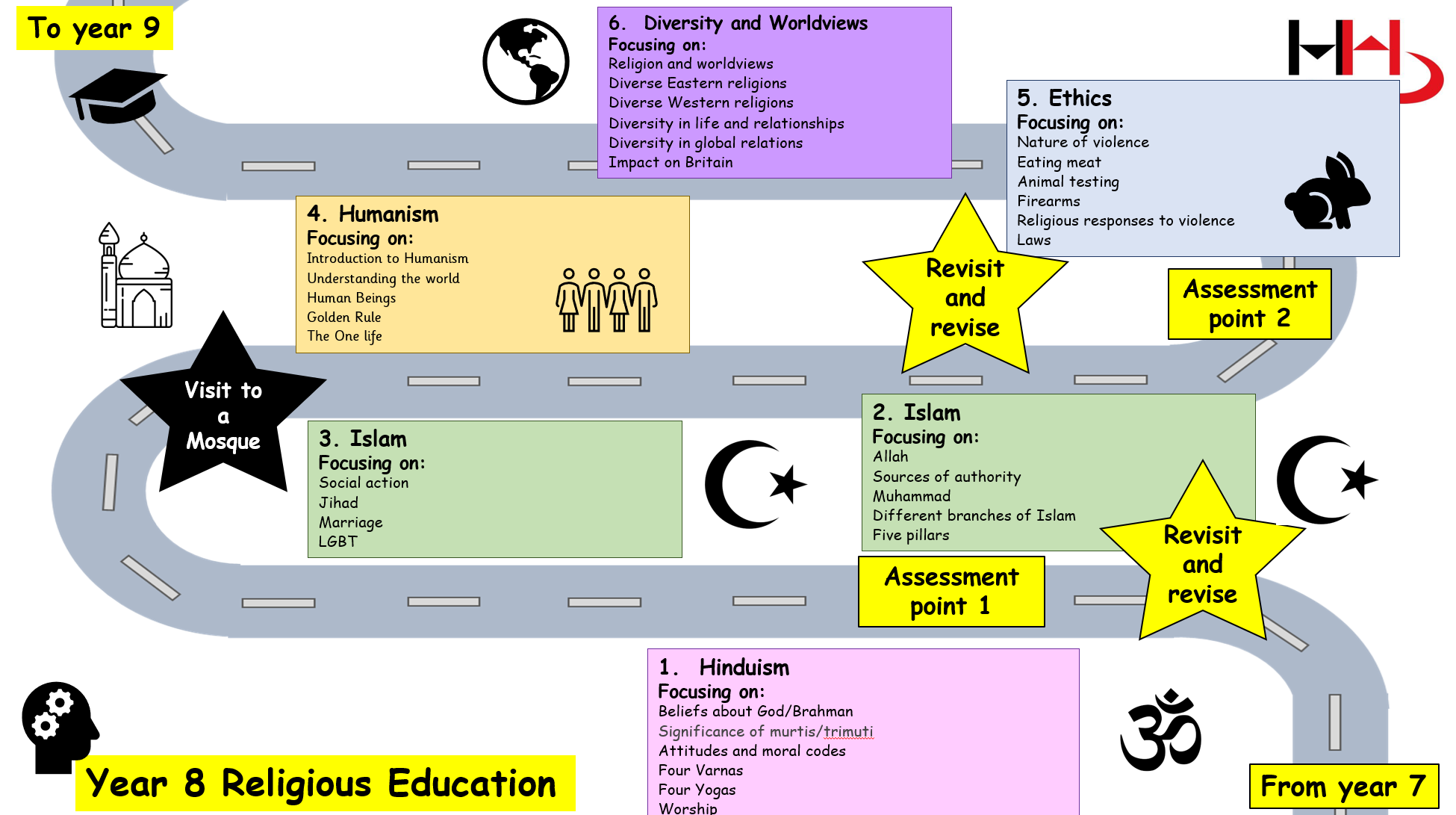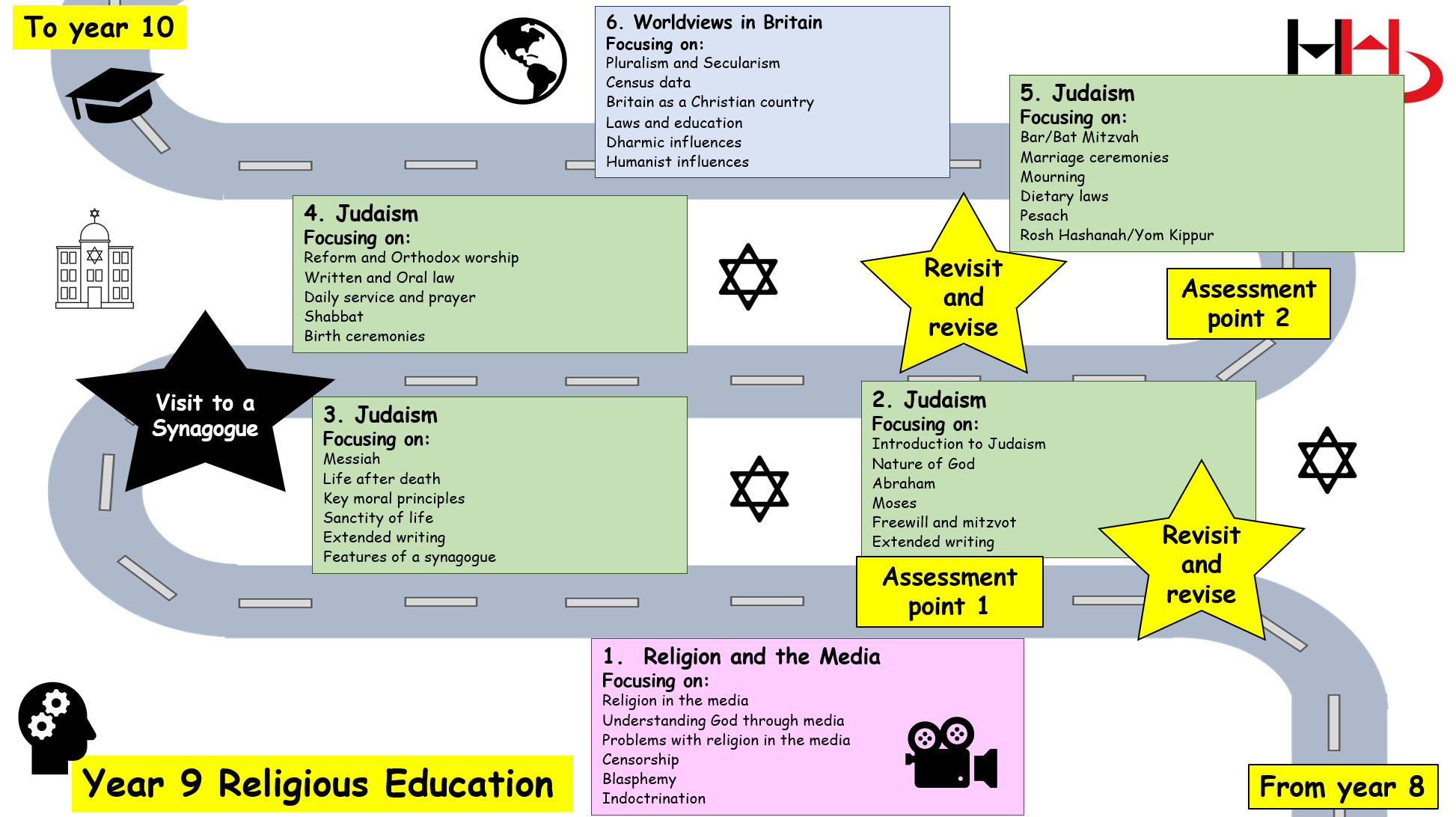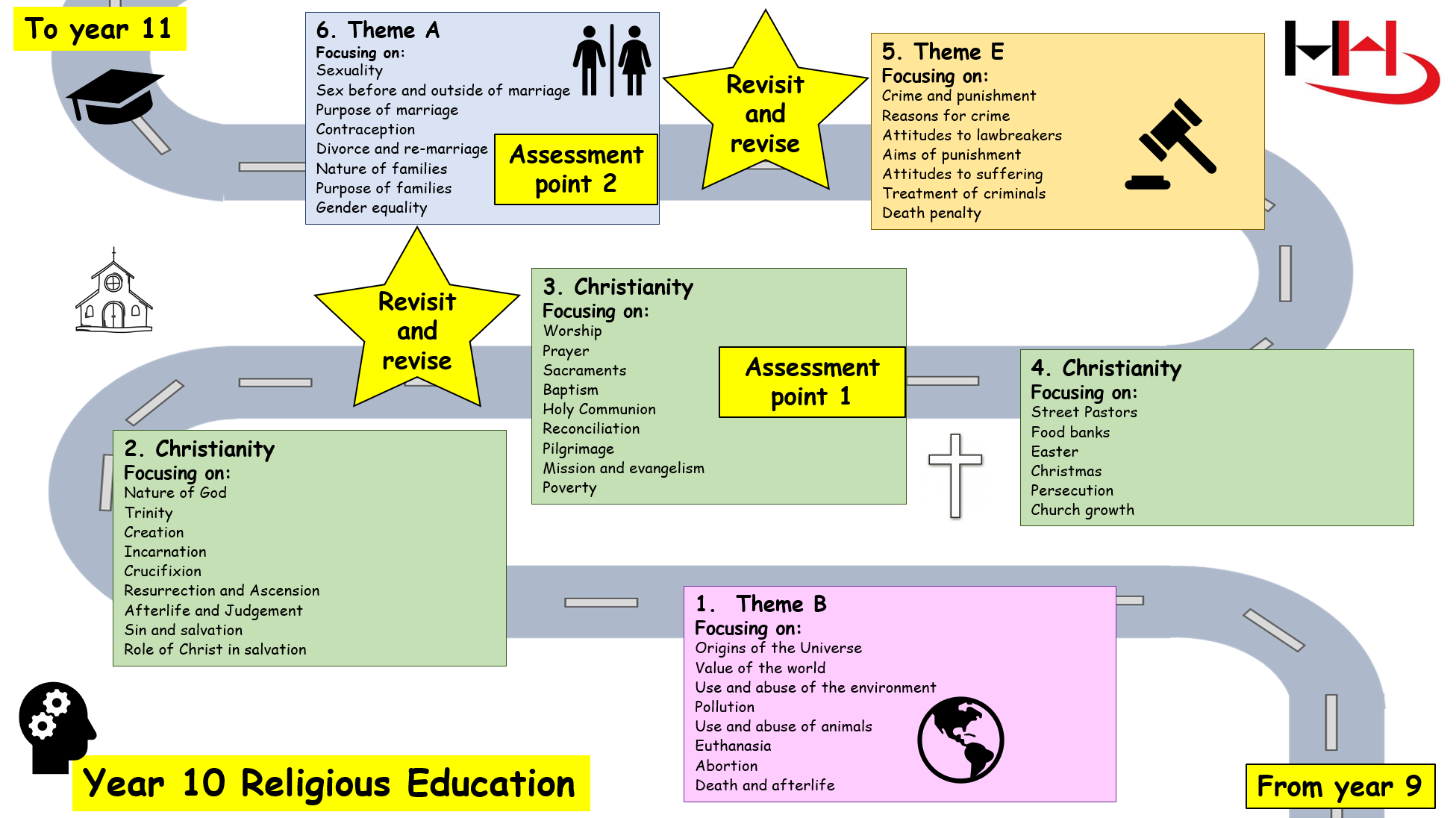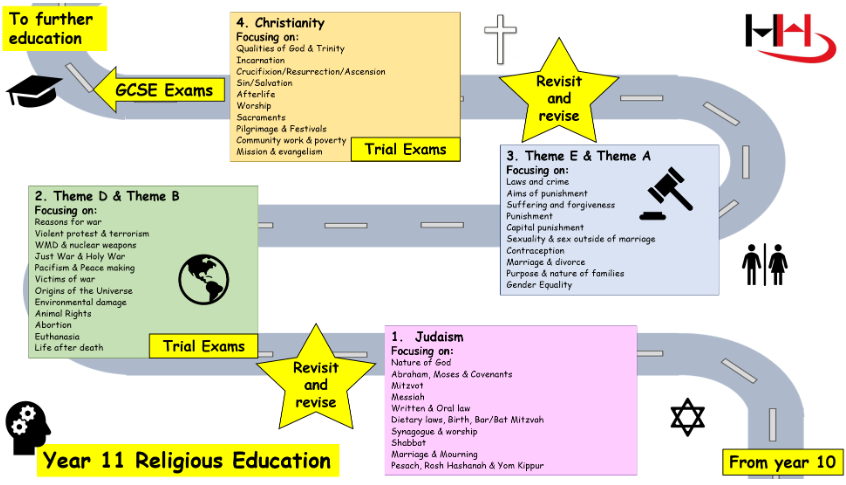RE
Job Options
Jobs directly related to RE include:
Jobs where RE would be useful include:
- Advice worker
- Archivist
- Charity fundraiser
- Counsellor
- Civil Service administrator
- Community development worker
- International aid/development worker
- Mediator
- Newspaper journalist
- Police officer
- Youth worker
Intent
Our aim is to encourage tolerance in a multicultural society. We do this in R.E. by exploring the beliefs and practises of a range of different faiths. In KS3; five of the major world religions are studied alongside worldviews, philosophical, theological and ethical topics. This encourages students to explore their identity, giving context to and developing their understanding of religious and non-religious world views.
Throughout KS3 students will develop their understanding of what religion is, along with what it means to be human, religious and non-religious beliefs about the purpose and meaning of life, what people believe about God, how faith and belief affect the way people live their lives, how people express their religion and beliefs and how important events are marked for different religious groups. Students will be able to compare the similarities and differences between the major world religions, seeing how they influence each other, and key concepts are repeated. Students will develop an understanding of the ways in which religions have formed as well as their own personal relationships to religious and non-religious worldviews.
In the classroom and through enrichment opportunities, informed conversations will take place that allow the wider context of multi-faith Britain in the C21st century. Students’ spiritual, moral, social and cultural development will improve as a result of these conversations. Religious Education will promote social cohesion and encourage respect for all faiths and secular beliefs, providing students with powerful knowledge and skills.
At KS4 this will be deepen as students consider questions about belief, values, meaning, purpose and truth. At Key Stage 4, we study the AQA Religious Studies A route (8045). This is single tier entry and has two examination papers. Two major world religions will be studied in depth; Christianity and Judaism as well as four contemporary ethical themes; relationships and families, religion and life, peace and conflict and crime and punishment. In an ever-changing world, these religious themes outlined in Paper 2 are pivotal to developing rounded citizens of the 21st century. Students will continue to develop their own attitudes towards religious issues and appreciate how religion, philosophy and ethics form the basis of our culture.
Students will be able to think critically, analyse and discuss big questions. This will begin in KS3 as a foundation for KS4. Where theological concepts and sources of wisdom will be interpreted and evaluated. Research skills will be introduced from year 7 and students will be able to apply and consolidate these skills throughout KS3 and KS4.
The curriculum has been developed with the Lincolnshire Agreed Syllabus in mind at KS3 as well as recent Ofsted research review series and Commission on Religious Education Report; Religious and Worldviews. The KS3 curriculum is used to support the AQA Religious Studies A route (8045) at KS4. As a department we have regular meetings to discuss our curriculum, these are both formal meetings every half term and informal conversations throughout the term. This has allowed us to review the curriculum and develop our intent. As a result our planning, handbook and resources have been improved throughout the 22/23 academic year, ready for 23/24. We have introduced new units which focus on worldviews and have introduced difference lens’ to ensure a rich
curriculum that affirms the importance of learning about religious and non-religious worldviews. We have introduced student voice to gain student feedback and ensure that students are seeing the intent as outlined in the curriculum. The department developed knowledge organisers to support students at KS4, this will be ongoing for KS3 as new resources are created for KS3 in 2023/2024. Students will be given access to roadmaps, trackers and knowledge organisers to understand their place in and journey through the curriculum. This will outline the most useful content and how ideas are unified and developed.
Religious Education is important in helping students understand a wider world view, we are dedicated to giving students cultural capital, especially those who face social disadvantages. Rather than differentiating our teaching, we are adaptive teachers. All students have the same goal, but we allow them different ways of accessing it. This is done through scaffolding, chunking and peer support. As well as this, word mats are being developed in the department to support EAL, PP and SEND students. We are also using BDA recommendations so all students can access our resources. Students are allowed to present their work in different ways and dual coding is used to build confidence. Marking is done with pupil progress in mind, a new marking policy was implemented in 2023 to ensure feedback is effective, closes gaps and motivates students. EEF guidance is also followed when working with LAs.
Implementation
The Religious Education curriculum is delivered following a well-constructed and thoughtful planning sequence of lessons. Students are taught in sets and key concepts are presented repeatedly throughout the curriculum, knowledge and skills are revisited, reinforced and extended on to develop complexity, depth and breadth.
Key topics are revisited and content as well as assessments are tailored to ensure it is age appropriate for each year group. The curriculum has been developed with the Lincolnshire Agreed Syllabus in mind at KS3 as well as recent Ofsted research review series and Commission on Religious Education Report; Religious and Worldviews. The KS3 curriculum is used to support the AQA Religious Studies A route (8045) at KS4. As a department we are responsive to contextual issues and our resources are tailed to the students needs based upon the professional knowledge of the team.
Staff are constantly seeking professional development, four of the department attended external CPD for KS4 GCSE teaching in the last year. All staff have accessed online CPD for KS3 and curriculum thinking with the view to continue to develop our curriculum, support professional development and increase student engagement and attainment. This knowledge, alongside examiner specialist knowledge by a fourth member of staff allows internal CPD to take place and develop staff understanding of the GCSE requirements. The RE department is in a strong position with a KS2 specialist and SENCO as part of its team. Their expertise is drawn upon and used to support our curriculum development and student experience. Time is allocated in termly meetings for the sharing of good practice, reviewing lesson resources and deliberate practice of delivering resources. Staff receive feedback on what went well and areas to develop through drop ins and formal lesson observations in order to improve practice.
As a department we have regular meetings to discuss our curriculum, these are both formal meetings every half term and informal conversations throughout the term. This has allowed us to review the curriculum and develop our intent. As a result our planning, handbook and resources have been improved throughout the 22/23 academic year, ready for 23/24. We have introduced student voice to gain student feedback and ensure that students are seeing the intent as outlined in the curriculum. The department developed knowledge organisers to support students at KS4, this
will be ongoing for KS3 as new resources are created for KS3 in 2023/2024. Students will be given access to roadmaps, trackers and knowledge organisers to understand their place in and journey through the curriculum. This will outline the most useful content and how ideas are unified and developed.
The curriculum is taught through weekly timetabled lessons delivered by subject specialists. Teachers will be given long and medium planning, curriculum overviews and provided with explicitly planned resources at the start the academic year, so they can differentiate any tasks for identified students as necessary to ensure that all our students can engage with the key content and acquire the same powerful knowledge. The lessons are created from the sequential lesson plans which specifically outline the key knowledge that must be taught to all students. Every lesson is chunked to support students cognitive load and promote understanding and application of information rather than just memorising.
Formative assessment takes place every lesson through ongoing directed questioning and recall questions at the beginning of every lesson, which students self-assess to close knowledge gaps. Plenary activities ensure that teachers can identify and correct gaps and misconceptions before students leave the classroom. The medium term plans are seen as working documents in which misconceptions can be recorded and planning can be suitably adapted to address. The curriculum is reviewed every year to ensure any curriculum changes, legal changes, medical or technological advances are addressed. Teachers keep records of how learners are achieving and intervene effectively and work with the department collaboratively to ensure skill and knowledge gaps are closed. Summative assessments will take place at the end of every topic and twice yearly formal calendared assessments take place. These are scrutinised, moderated and evaluated in a timely manner to ensure the data around pupil attainment is used effectively.
The Religious Education curriculum will be further supported external speakers and offsite educational visits in order to enhance subject knowledge and provide learners with real life experiences. Religious Education is also supported by the whole school curriculum, with topics such as LGBTQIA+ being taught in PSHE, the biology of puberty and reproduction and a range of perspectives on human relationships being covered in English. Alongside this, the curriculum explores British values and allows students to understand modern Britain and the wider world.
Impact
As a result of the RE curriculum at Haven High all students will be equipped to be active, tolerant and mindful citizens of multicultural Britain and the world. Students will be able to understand their own identify, views and beliefs in relation to worldviews. The curriculum allows students to make well-informed choices regarding their future family and work life, as well as supporting them in articulating different ideas and views about world affairs.
Students are able to access and enjoy learning about complex worldviews, philosophical concepts and theology which increases their cultural capital. This is achieved by breaking down concepts and providing selected examples. In lessons, there are good levels of engagement and students ask interesting and pertinent questions. They engage with contemporary issues and enjoy discussions around the existence of God, the meaning of life and the relevance of religious practices. Furthermore, our emphasis on subject-specific and wider vocabulary, language and meaning, gives students the tools to become independent learners. Students have built up a schema of knowledge based on a range of substantive concepts enabling them to make sense of the world around them, to understand more nuanced debate and to contribute to discussion from a solid frame of reference.
Students are able to have greater appreciation of their own identity and their place in the world as a result of the Religious Education curriculum. They can understand the diversity in human experience, analyse evidence and form their own judgements whilst considering challenges to these judgements, students have developed the intellectual tools and mind-set to open minds and appreciate the reasoned arguments of others.
Students show progress in internal and external assessments. Most students make progress in KS3 and continue to make progress through KS4 making particularly rapid progress in the final stages of the course. Staff put in effective intervention to reduce the gaps between the progress of disadvantaged and other students.
Regular use of low-stakes testing and quizzing supports all students to develop their subject knowledge. Repetition of key content and skills ensures that knowledge moves from short-term memory to long term memory. Students become increasingly familiar with religious concepts. Their ability to write extended answers evidenced that social disadvantage is being challenged. Students are given opportunities to debate, practice exam questions, evaluate their ideas and justify their own opinions and decisions.
Students may go on to choose related A level, degree and FE courses, such as RE, Philosophy and Ethics, Sociology and Psychology, careers in the uniformed services, health and social care roles and working in media or international development. Others may well go on to work in the community as volunteers, working for food banks or a more actively religious role such as an imam or lay reader.
